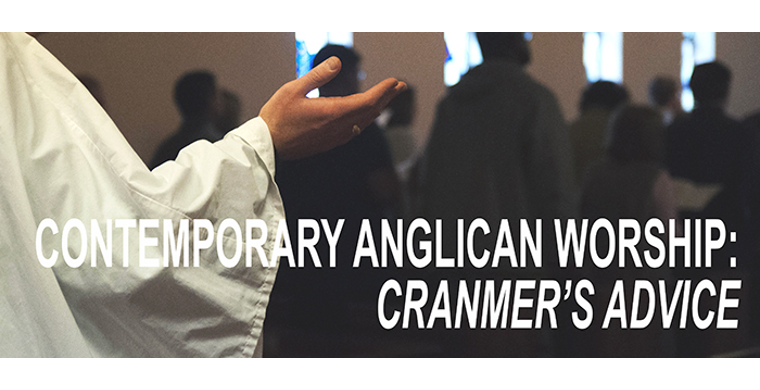The Wealth 0f Classic Anglican Liturgy (2)
By Roger Salter
Special to Virtueonline
www.virtueonline.org
August 31, 2015
It is often alleged that Cranmerian forms of worship are dour, overly penitential, and even groveling before the God whom we approach. Lingering sparks of self-righteousness and self-gratification ignite such sentiments. Repentance, deep and sincere, always characterizes our coming to God whatever our mood or circumstances and our worship of him is primarily sacrificial and not self-satisfying. To stoke pleasant feelings and agreeable emotions is not the fundamental aim in the exercise of honoring God. Worship is recognition of his worth, again, whatever our mood or circumstances - such factors do not affect our obligation to pay our homage to God. Our variableness should not influence the duty that we owe.
When we consider the verities of God's word from which worship emerges, and express the convictions that arise from Holy Scripture, normally our contemplations result in sheer spiritual delight, for our gaze upon the Lord in his exquisite Three-ness is utterly entrancing. Thought, perception, understanding constitute the basis of our divine service. The feeling, emotion, and thrill of worship, should they be granted to us by the Holy Spirit, have their true source in the vision imparted by Holy Scripture. To this end Stephen Charnock opines: It is impossible to honor God as we ought, unless we know him as he is.
Cranmer ensures, through biblical craftsmanship, that we gain glimpses of God as he is, and not as we sometimes fancy or prefer. It is in this God of infinite majesty and immeasurable mercy that his liturgy for the Daily Offices (Morning and Evening Prayer) causes us to rejoice, as "we set forth his most worthy praise". The Te Deum throbs with gladness at the greatness and grace of the Lord. The following canticles (and responses) ring with the sound of celebration:
* Praise him and magnify him forever.
* Be joyful in the Lord all ye lands: serve the Lord with gladness, and come before his presence with a song.
* Endue thy ministers with righteousness. And make thy chosen people joyful.
* My soul doth magnify the Lord: and my spirit hath rejoiced in God my Savior.
* O sing unto the Lord a new song: for he hath done marvelous things.
* Show yourselves joyful unto the Lord, all ye lands: sing, rejoice, and give thanks. Praise the Lord upon the harp: sing to the harp with a psalm of thanksgiving.
* O show yourselves joyful before the Lord the King.
* Let the floods clap their hands, and let the hills be joyful together before the Lord: for he cometh to judge the earth.
* Let the people praise thee, O God; yea, let all the people praise thee . . . O, let the nations rejoice and be glad.
Joyful praise is the thread that binds together the solemn and the celebratory elements of sound Scriptural worship that bring balance to our comprehension of God as sovereign Savior and holy Judge. The BCP inculcates piety in proportion. Idiosyncrasy and embarrassing excess of expression and behavior are precluded by well ordered and reverently composed liturgy such as prevailed in ancient Israel and the early Church. How can anyone peruse the text of our standard Anglican liturgy and not be deeply moved and enthusiastic in our corporate adoration of God. The Holy Spirit working with declarations of truth causes us to yearn from the soul, "O Lord, open thou our lips". Truth will tell out its affects upon and effects within our minds and hearts.
There are many aspects of saving truth that need to be heralded in our hours of worship together and "Cranmer" may well need its supplements to capture other facets of the full revelation of God, and simplified primers may certainly be of assistance to the uninitiated in liturgical worship. But there is a richness and a robust presentation of Christian conviction in Anglicanism's real Book of Common Prayer (1662). Less worthy volumes both of preceding and later date bear the same title (buyers beware). Cranmer revised his work and would no doubt approve of any improvement or orthodox alternative if deemed necessary. He anticipated development. There was no selfish pride in his product. Humility and glad humor (disposition) are found in his precious publication.
Through Cranmer we bow before the Lord and by his truth the Lord himself lifts us up. The energy of the Spirit is felt in the elegance of the language that is suited to its task of ennobling the sinner in the righteousness and mind of Christ. The great truth that gripped Cranmer in all its dimensions and ramifications was Justification by Faith and the force that inhabited and stirred his heart was the passionate love for Christ that prompted his labours and directed his life, even to the fiery stake. His was not a solo effort. He drew from the fathers and great men of faith from preceding generations. English and Continental Reformers shaped his designs for gospel clarity and believing adulation of God and gratitude.
The Reformational Book of Common Prayer is a model for Christian thought and a means of Christian maturation as further exploration will disclose.
To be continued...














